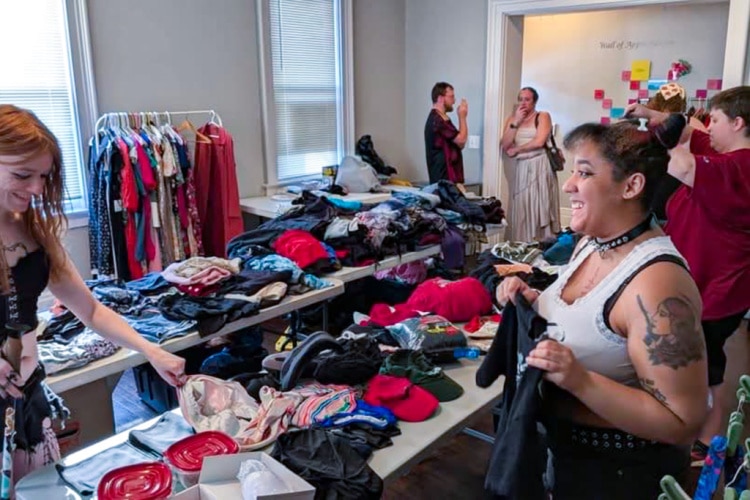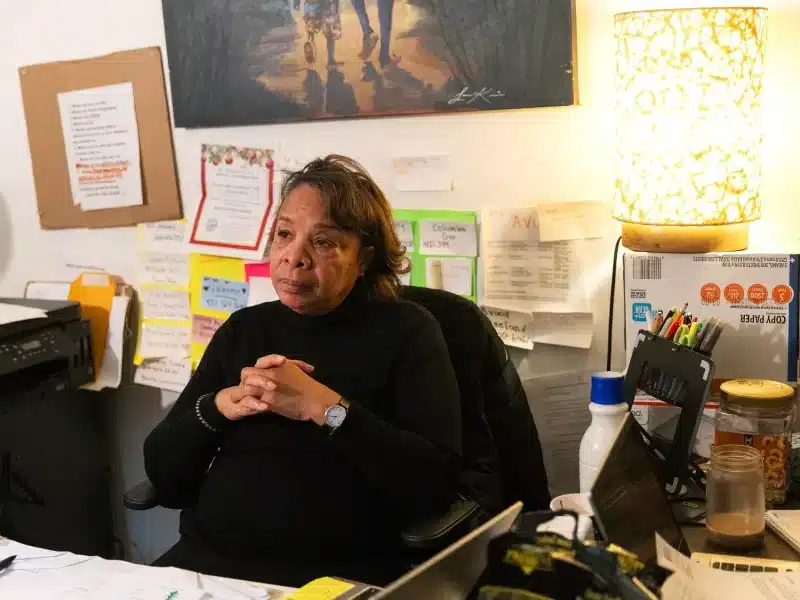Two formerly homeless Cincinnatians tell their stories
Meet Ronnie and Willa, two Cincinnati residents who have faced what 25,000 people in the city experience each year: homelessness. Here they share their stories in video.
Meet Ronnie and Willa, two Cincinnati residents who have faced what 25,000 people in the city experience each year: homelessness. We asked them to share their stories: how they became homeless, how they dealt with the poverty and what paths they took to regain their independence. They reflect on problems with job loss, addiction and unexpected tragedy—and what it takes to survive.
“You don’t have to be negative about yourself when you are homeless. You make the most of what you have.”
Ronnie from New Media Bureau on Vimeo.
Passing by the University of Cincinnati Recreation Center recently, 40-year-old Ronnie Phillips was reminded of his first swim meet as a child in elementary school.
“You know, I was at UC once for a swim meet,” Ronnie said, pausing for a moment. “I almost got first place … but someone snuck up and touched the wall before me.”
Raised by a single mother, Ronnie had a fairly ordinary childhood. He learned how to cook in home economics, worked hard in school and joined the swim team. But Ronnie was very poor. And while many people take for granted a stable home and the step-by-step process of growing up—graduate high school, go to college, earn a degree and eventually land that dream job—poverty can leave those like Ronnie a few steps behind, not quite making it.
Ronnie grew up in Millville, Ohio, just north of Cincinnati. He and his mother moved to Evanston in the late ’80s. After graduating from high school, Ronnie worked at Taco Bell for nine years with a goal of becoming a chef manager. He succeeded.
“People didn’t think I could be a chef manager because they thought I was too nice. But I became certified to run my own kitchen,” Ronnie said.
Unfortunately, this achievement was short-lived. Ronnie lost his job and moved in with his mother, dependent on her for financial support. In 2009, a grievance with his mother’s landlord forced Ronnie to move out.
“The first thing I wanted to do was to get on my feet and find my own apartment,” Ronnie explained with a sense of resolve in his voice.
“I felt lazy, freeloading off of my mother. So I turned to drop-in centers for a sense of responsibility.”
Ronnie admittedly got off to a rocky start. “I would just lay around on the benches in the morning doing nothing,” he said. But gradually, he used the centers’ services, such as clothing banks, pantries, soup kitchens, as well as apartment and job placement services, to gain independence.
“You don’t have to be negative about yourself when you are homeless,” Ronnie said. “You make the most of what you have and don’t have to look at homelessness as a negative experience … but you have to have patience.”
Ronnie also began selling Streetvibes, a newspaper published twice a month by the Greater Cincinnati Coalition for the Homeless (GCCH) with the mission of educating the public about homelessness. People like Ronnie buy Streetvibes from the coalition for 25 cents a paper and sell them for $1.50. This supplemental income can help individuals pay for bus cards, housing expenses or food. The most he has made is $75 in one week. For Ronnie, selling the paper gives him a sense of pride and fulfillment.
“The proudest thing for me with Streetvibes is return customers,” he said. “One time when I was about to get my new apartment, a customer gave me a brand new TV. … That was a good day.”
Ronnie used money from Streetvibes’ sales to move into a “step-up dorm” within the drop-in center. This dorm allowed for more independence and flexibility, but required more from its tenants. Ronnie recalled an incident of someone at the dorm being hit over the head with a chair while arguing about what to watch on television.
“That’s one thing about poverty … I’ve seen people get into fights for the littlest things,” Ronnie said. “A lot of these people run out of time or get banned from the drop-in center for fighting. Some don’t stay there because they think it has too many rules. … What they don’t realize is that drop-in centers help you find your own place.”
In 2011, Ronnie moved into an apartment. He has continued selling Streetvibes. Despite that, he remains reliant on public assistance. He currently lives in a one-bedroom apartment obtained with help from the Excel Development Corporation. Excel is a part of the Hamilton County Mental Health and Recovery network and provides affordable, independent housing for adults suffering from a mental disability.
“When I’m gone, I want to leave something behind, something to remember me by.”
Willa Jones from New Media Bureau on Vimeo.
Willa D. Jones saved every penny she made as a Streetvibes distributor to publish a poetry anthology in 2012 about her life on the streets. Entitled My Life in Poem, the book gives an insightful look at her struggles with homelessness and addiction and her journey to find faith.
When asked why she wanted to write a book, Willa paused and looked directly into the camera. “Because it was something I had to do. When I’m gone, I want to leave something behind, something to remember me by,” she said.
The idea of writing a book first came to her at the Anna Louise Inn, a low-cost housing, health service and transitional facility for women. Her husband Darryl had just passed away after having a stroke.
“I couldn’t talk about my husband because it was eating me up on the inside,” Willa said. “That’s when someone told me, ‘If you can’t talk about it, you need to write about it.’”
“When I first wrote my book, everybody wanted one,” Willa said, including a cousin from Greenville, S.C.
“I still haven’t gotten the money he owes me,” she said, holding back laughter.
A lifelong resident of Cincinnati, Willa spent most of her childhood with her grandmother in Avondale. After graduating high school, she became a nursing assistant, caring for her ill grandmother until she died. “I wasn’t going to put her in a nursing home,” Willa said.
Around the time of her mother’s death, she met Darryl. They were together for 20 years, and had a home in College Hill. Both worked at Jergens in Cincinnati. It was at Jergens where Darryl suffered his stroke.
“One day they called me over the PA system, shouting, ‘Darryl’s down!’ The only thing I could think was, ‘What’s he doing down? He needs to get up!’” Willa said.
Darryl was transported to University Hospital where doctors had to amputate both of his legs. He passed away within a year.
“When Darryl passed, I still had the house, a car … we had just put a swimming pool in the back, too,” Willa said.
Unable to keep up with the bills and distraught over the loss of her husband, Willa took to the streets.
She tried numerous drop-in centers. She stayed with people she had met during harsh winter months. As soon as the season broke she lived in Washington Park.
After treatment at Crossroads Center for alcoholism, Willa was accepted into Anna Louise Inn’s Off the Streets program. The program helps women who’ve been involved in prostitution or homelessness move toward safety, recovery, empowerment and community reintegration. For $80 a week, Willa was able to rent a room at the inn and build her life again. Support groups and education are provided to help with recovery.
Cincinnati offers a lot of assistance to the homeless, Willa said. “This is the only city I know that you can live homeless, but look rich.”
Food pantries and soup kitchens provide meals throughout the day, seven days a week. There are clothing services for those in need, as well as a shower house for bathing. “There is even a beauty shop that gives free haircuts … Sister Betty at St. Francis,” Willa said.
When asked about bigotry or discrimination against the homeless, Willa took a deep breath and sighed. “When I was homeless, I never had time to think of those things, but I definitely see it now.”
She currently lives in Over-the-Rhine in a small but quaint apartment, and she is writing a second book about recovering from homelessness. The title: Life Goes On.
You can purchase My Life in Poem at Amazon.com.
Matthew Woolley is a freelance writer and recent graduate of the University of Cincinnati. He served as Soapbox’s winter/spring intern. Follow him at @Cincy_Matthew.














